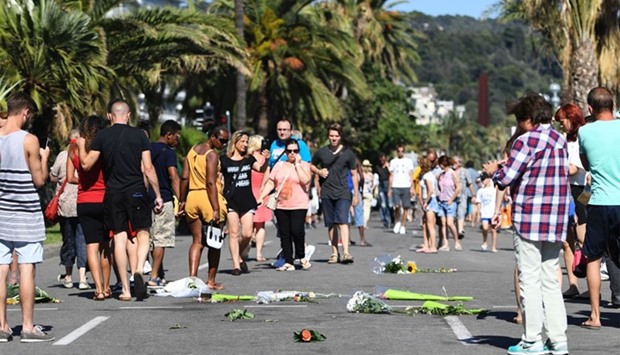In a statement via its Amaq news service, IS said one of its "soldiers" carried out Thursday night's attack "in response to calls to target nations of coalition states that are fighting (IS)".
Tunisian Mohamed Lahouaiej-Bouhlel, 31, ploughed a 19-tonne truck into a crowd of people who had been watching Bastille Day fireworks in the French Riviera city, killing 84 and injuring 200.
After crisis talks in Paris, French Defence Minister Jean-Yves Le Drian noted that IS had recently repeated calls for supporters to "directly attack the French, Americans, wherever they are and by whatever means."
"Even when Daesh is not the organiser, Daesh breathes life into the terrorist spirit that we are fighting," he said, using an Arabic name for IS.
Facing its third major terror attack within 18 months, the French government is coming under fire from opposition politicians and newspapers demanding more than "the same old solemn declarations".
Interior Minister Bernard Cazeneuve said that, after gunmen and suicide bombings, France was now facing "a new kind of attack".
Speaking as France began three days of mourning on Saturday, he said Lahouaiej-Bouhlel "had not been known to the intelligence services because he did not stand out... by being linked with radical Islamic ideology".
Marine Le Pen, the far-right leader of the National Front party, called on Cazeneuve to step down.
"In any other country in the world, a minister with a toll as horrendous as Bernard Cazeneuve -- 250 dead in 18 months -- would have quit," she said.
'Radicalised quickly'
Police said Saturday they had arrested four more people linked to Lahouaiej-Bouhlel, in addition to his estranged wife who was taken into custody on Friday.
Cazeneuve said the father-of-three "seemed to have been radicalised very quickly, from what his friends and family" have told police.
"We are now confronted with individuals open to IS's message to engage in extremely violent actions without necessarily having been trained or having the weapons to carry out a mass (casualty) attack."
At least 10 children were among the dead as well as tourists from the United States, Russia, Ukraine, Switzerland and Germany.
A spokeswoman for the Nice paediatric hospital said 16 bodies had not yet been identified. She said five children were still in "critical condition", and an eight-year-old in a stable condition had not been identified.
Tahar Mejri is one of 30,000 people who had gone to watch the fireworks on the palm tree-lined Promenade des Anglais when their night turned to horror as the truck left mangled bodies strewn in its wake.
He lost his wife in the attack and was hunting Saturday for his four-year-old son, Kylan.
"I have called everywhere, police stations, hospitals, Facebook and I can't find my son. I have been looking for him for 48 hours," he told AFP.
"My wife is dead, where is my son?"
Hours later, he emerged screaming from the Pasteur Hospital in the north of Nice after learning that his son was dead.
France 'deeply shocked'
Cazeneuve said the carnage had "deeply shocked the French and at the same time shows the extreme difficulty of the anti-terrorism fight."
IS also claimed responsibility for the November 13 attacks which killed 130 people in Paris, while gunmen in January 2015 attacks on the Charlie Hebdo weekly and a Jewish supermarket were linked to both IS and Al-Qaeda.
A French parliamentary inquiry last week criticised numerous failings by the intelligence services over the Paris attacks.
France is also home to hundreds of jihadists who have flocked to fight alongside IS.
Presidential contender and former prime minister Alain Juppe said Friday that the latest carnage could have been prevented if "all measures" had been taken.
But government spokesman Stephane Le Foll slammed Juppe's comments, saying there were more than 185 police, gendarmes and soldiers on the ground, as well as municipal police and a vast network of surveillance cameras.
"Despite all of that, this man's decisions... created the drama and horror we experienced."
Cazeneuve also defended the security measures taken for the celebrations of France's national day.
He said police cars were unable to follow the truck onto the seaside walkway after it had "violently forced through the barriers" and onto the sidewalk.
The truck zigzagged for two kilometres (1.2 miles) through the crowd before police bullets killed the driver and brought an end to the carnage.
Depressed loner
Lahouaiej-Bouhlel's father said he had suffered from depression and had "no links" to religion.
"From 2002 to 2004, he had problems that caused a nervous breakdown. He would become angry and he shouted... he would break anything he saw in front of him," Mohamed Mondher Lahouaiej-Bouhlel said in Tunisia.
Neighbours described the attacker, who worked as a delivery man, as a loner who never responded to their greetings.
He and his wife had three children, but she had demanded a divorce after a "violent argument", one neighbour said.

